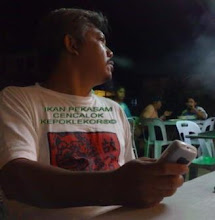I just finished reading Interlok about an hour ago.

1- I find the novel interesting and if we minus certain t
hings like the insulting word, the book tells us a reflection of what the country was during those era. There is similarities of what he wrote with the stories I heard from my grandparents and my parents. I had the opportunity of living in a similar setting in Kedah back in the late 60s and early 70s with a similar setting like in this novel. There were 2 Chinese sundry shops and our village was surrounded by several rubber estates.Several cousins worked and lived the the estate quarters with their Tamil neighbours. Malay folks bought( actually hutang,with several buku 555 ) from these Chinese traders,sold their rubber and rubber scraps and occasionally padi to these Chinese towkays.And some did lost their land and padi fields like the character Musa.
During those times it was common to hear the Malay elders mentioned the insulting word Pariah when talking about certain Tamil person who were always drunk on samsu(there was a toddy producing area at Sg Batu and Tupah near Merbok back then, with a govt toddy shop nearby)Those not badly drunk were not called pariah.I didn't understand what that word meant. Some Malays said it meant bad character or drunkard.Some say it was one of the caste.There are some elders who scolded kids who mentioned the word. The word became common in our village to describe bad characters not only to the Indians but the Malays too.
2- Back in the early to late 60s, I think it was common usage of the insulting word in many Malay villages surrounding large rubber estates, with many Malays not knowing the word is insulting their Indian neighbours and friends.And during those times many Malays(and Indians and Chinese too) tend to mixed among themselves and if they moved to the city mixed with the fellow state mates.Their contacts were basically for commercial purposes.
3-Most kids go to venucular schools. Those staying near a town might go to an English school where they have the oppourtunity to mixed with different races. I was fortunate that I and my siblngs went to these type of schools and made lots of friends from different races.And that was during the May 13th episode!
4-Later on the English medium schools were abolished and converted into Sekolah Kebangsaan.And the same time the venecular schools were maintained. In areas where there are no venucular schools the Indians and Chinese sends their chldren to the sekolah kebangsaan.If there are venucular schools they prefer to enrolled their kids into the SJK Tamil or SJK Cina( now there are a number of Malay kids in SJK Cina).
I understand the importance of these venucular schools to the Chinese and Indians, but in a way it prevents our children to mixed together at an early age.
Many will only start their 'muhibbah' in secondary school at 13 years of age. Many only know about their race and the prejudices their community had towards the other races.
This does not confined to the Malays but also to the Indians and Chinese. It is common knowledge that the Malays think that the Indians are rowdy and drunkards and the Chinese are cheaters. The Indans and the Chinese think that the Malays are a lazy lot who likes to 'enjoy' and 'lepak di kedai kopi',are drug addicts and dependent to govt hand outs. Each and every race think they are better than the other!
With these already instilled in their mind subconciously, do we think most will accept the other readily? Superficially we see our kids have no problems with each other.Thats right,just superficially. Look in the school canteens. You will see these kidsin groups of Malays ,Indians and Chinese.Look at the school padang.Who plays football there?Look at the basketball and badminton courts. Look at the hockey field.
5-And our politicians too played their roles in these unapparent segregation ( I call it unlocking interlok).Yes in the mainstream media its all for intergration.All for muhibbah.But what do they say when they are among their own races? What do they say about the other races?
6-Time changed. People changed.Sensivities changed.But attitude is difficult to changed. That is a challeged for all of us. We need to change aour attitude towards others IF we want to be bangsa Malaysia.We need to re-Interlok.
7-Interlok is a good novel.But we must understand certain words and phrases need to be change because 1967 is different from 2011.Words that people dont take offence in the 60s and offensive now.Wemust respect their feelings if we want to Interlock again.
If our forefathers can interlock, why can't we? We don't need to unlock the interlock.






